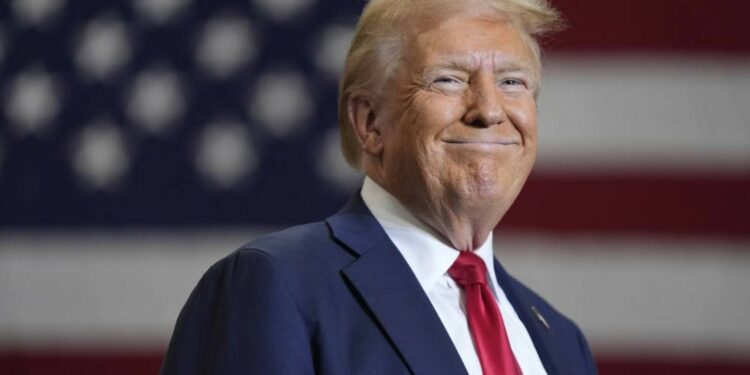The return of Donald Trump could have two different effects on European politics. It could force European nations to work together, to respond to the threat of US protectionism and the withdrawal of US support for Ukraine. Or it could turn European leaders inwards to focus on the defence of their national interests, in order to fend off the threat posed by homegrown Trumpians to incumbent governments. Keir Starmer seems to be trying to do a bit of both. He arrived in Budapest yesterday for a meeting of the European Political Community (EPC), trumpeting agreements with Serbia, North Macedonia and Kosovo on people-smuggling. This is the EPC, not the EU, and none of those three countries is (yet) an EU member, so he sidesteps Conservative accusations that he is trying to “reverse Brexit”.
The EPC was the ingenious creation of Emmanuel Macron, designed to be a new outer layer of the EU onion, with the strategic objective of offsetting Britain’s departure from the EU. So far, it has been helpful for the British government. Starmer can talk about international cooperation, which keeps the pro-EU wing of his own party happy — but the purpose is to deal with the problem of irregular migration, with the aim of keeping Nigel Farage at bay. The prime minister did the same thing the other day at the Interpol conference in Glasgow, where he called for a Europe-wide approach to organised immigration crime, which he said should be treated like terrorism.
The imminent return of Trump to the White House makes the twin-track strategy more difficult. “He will force us to do more,” said Mark Rutte, the Nato secretary general and former Dutch prime minister, who is also in Budapest. Again, Nato is not the EU, so there shouldn’t be any concerns about reopening the Brexit issue. But if Trump withdraws support for Volodymyr Zelensky, that will pose painful questions for European countries about how much extra they are prepared to spend to defend the Ukrainian people against Vladimir Putin’s aggression. It was a question that Starmer dodged at Prime Minister’s Questions on Wednesday, when Kemi Badenoch, the new Conservative leader, asked it. The UK already spends more on defence as a share of national income than any other Nato country apart from the US, but Labour has promised to raise that spending to 2.5 per cent of GDP without giving a timetable for it.
I suspect that Starmer’s plan is to wait and see whether Trump goes ahead with his simultaneous threat and promise to bring the Ukraine war to an end on day one. Zelensky is gambling on Trump’s aversion to being seen as “weak” to keep the supply of weapons flowing. But if Trump does turn off the funding taps, that could be a big problem. If Britain had still been an EU member, it might have been an opportunity to show leadership at a time when Macron is weak at home and Olaf Scholz’s government in Germany is collapsing. As it is, Viktor Orban, the Putin-sympathetic Hungarian leader who hosted Thursday’s EPC summit, slyly suggested that the EU should “reconsider” the “sustainability” of its support for Ukraine.
The real challenge from Trump, however, may come if he turns out to be serious about launching a trade war by putting up tariffs. That might be a painful way for the British electorate to relearn the lessons of free trade. This is a cycle that public opinion sometimes has to go through. There are times when tariffs are popular because they are seen as a way to protect domestic industries. But when they put up prices, and provoke retaliation, which puts up prices further, public opinion begins to understand the benefits of free trade. American public opinion also goes through these cycles from time to time: all candidates for the presidency promise protection during the campaign, but tend to behave more pragmatically in government. Even Trump was less protectionist than he purported to be, the last time he was in the White House. But if he does launch a trade war that causes a global recession, there is a chance that he will strengthen the case for easing the barriers to trade between Britain and the EU. At this point, Starmer’s reluctance to go near anything that could be portrayed as “starting to reverse Brexit” could be overcome. It is almost worth hoping for a global trade slump just to enjoy the irony of Trump helping to push Britain back into the arms of the EU.
Source link : http://www.bing.com/news/apiclick.aspx?ref=FexRss&aid=&tid=6730fbd0cd75405fb6f445e9a8179c92&url=https%3A%2F%2Fwww.gulftoday.ae%2Fopinion%2F2024%2F11%2F10%2Ftrump-could-end-up-pushing-uk-back-towards-eu&c=15604471958108727472&mkt=de-de
Author :
Publish date : 2024-11-09 23:50:00
Copyright for syndicated content belongs to the linked Source.



